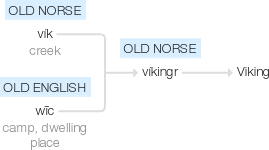Viking
from Old Norse víkingr, from vík ‘creek’ or Old English wīc ‘camp, dwelling place’.
wiktionary
Borrowed from Old Norse víkingr(“Viking”). Already in Old English as wīcing and Old Frisian witsing, wising, but extinct in Middle English and borrowed anew in the 19th century.
Old Norse víkingr itself is from Old Norse vík(“inlet, cove, fjord”) + -ingr(“one belonging to, one who frequents”) (the -r is the nominative desinence). Thus, “one from or who frequents the sea’s inlets”.
The Old English and Anglo-Frisian form, existing since at least the eighth century, could also have been derived from or influenced by Old English wīc(“camp”), on account of the temporary encampments which were often a prominent feature of the Vikings’ raids. [1]
etymonline
Viking (n.)
Scandinavian pirate, 1801, vikingr, in "The History of the Anglo-Saxons" by English historian Sharon H. Turner; he suggested the second element might be connected to king: But this later was dismissed as incorrect. The form viking is attested in 1820, in Jamieson's notes to "The Bruce." The word is a historians' revival; it was not used in Middle English, but it was reintroduced from Old Norse vikingr "freebooter, sea-rover, pirate, viking," which usually is explained as meaning properly "one who came from the fjords," from vik "creek, inlet, small bay" (cognate with Old English wic, Middle High German wich "bay," and second element in Reykjavik). But Old English wicing and Old Frisian wizing are almost 300 years older than the earliest attestation of the Old Norse word, and probably derive from wic "village, camp" (large temporary camps were a feature of the Viking raids), related to Latin vicus "village, habitation" (from PIE root *weik- (1) "clan").
The connection between the Norse and Old English words is still much debated. The period of Viking activity was roughly 8c. to 11c. In the Anglo-Saxon Chronicle, the raiding armies generally were referred to as þa Deniscan "the Danes," while those who settled in England were identified by their place of settlement. Old Norse viking (n.) meant "freebooting voyage, piracy;" one would "go on a viking" (fara í viking).
The name by which the pirates were at first distinguished was Vikingr, which perhaps originally meant kings of the bays. It was in bays that they ambushed, to dart upon the passing voyager.
